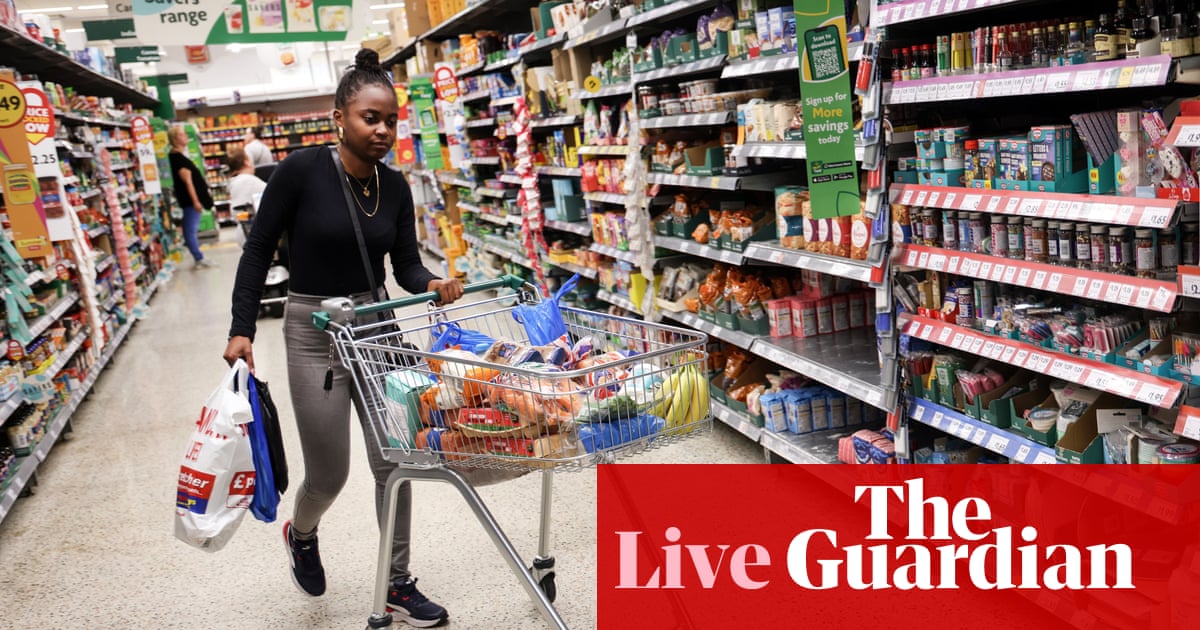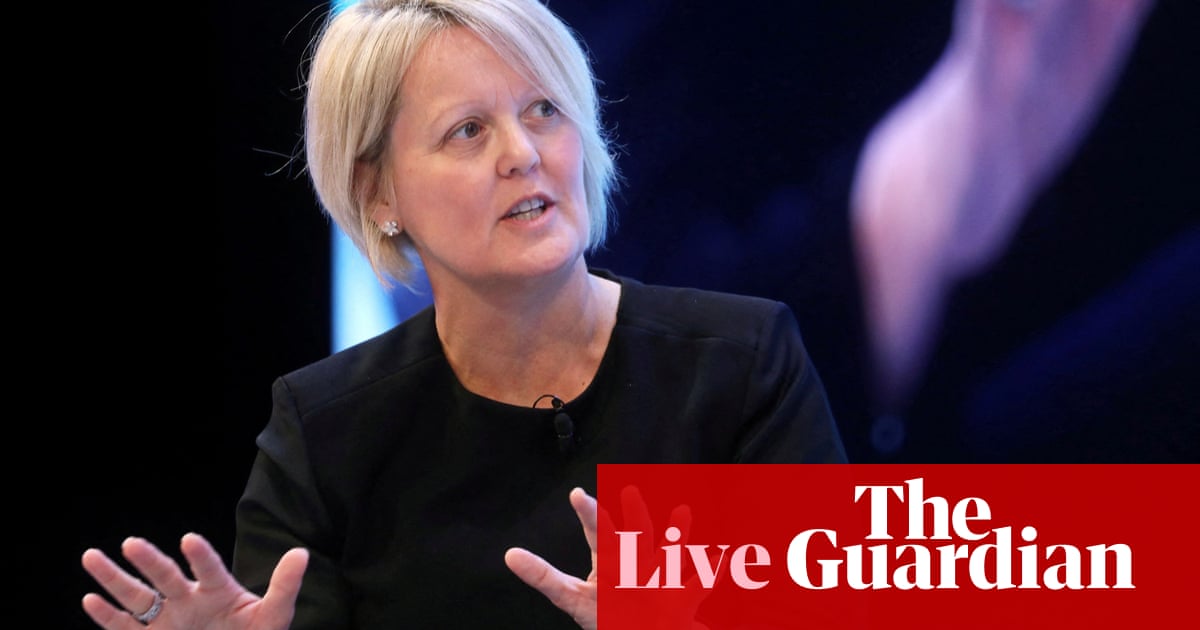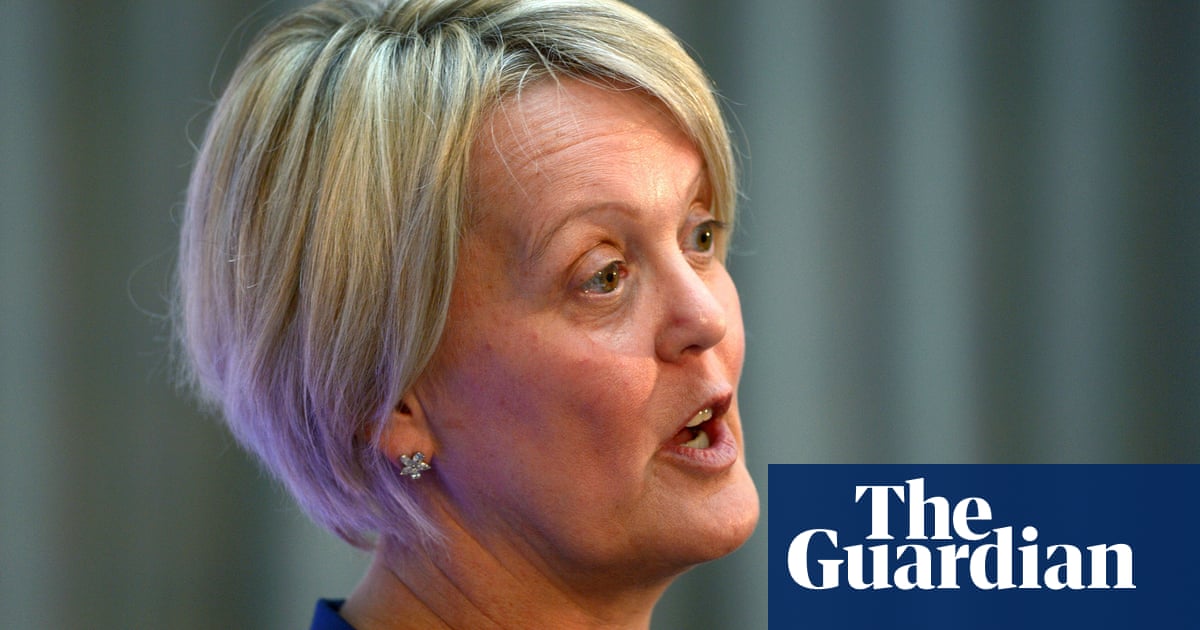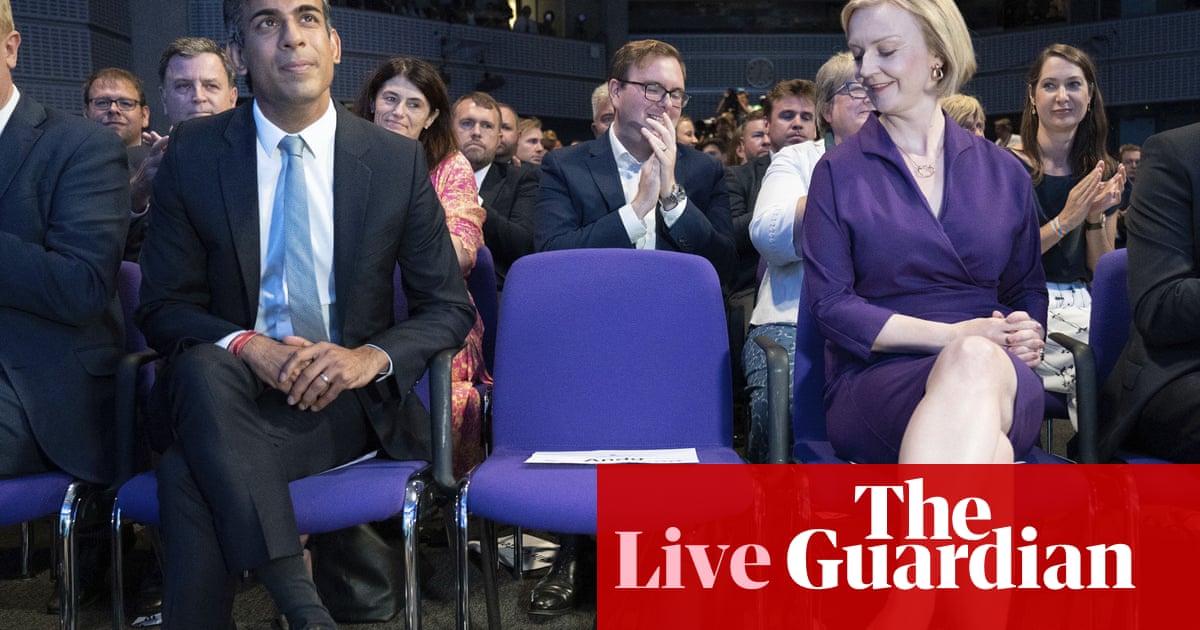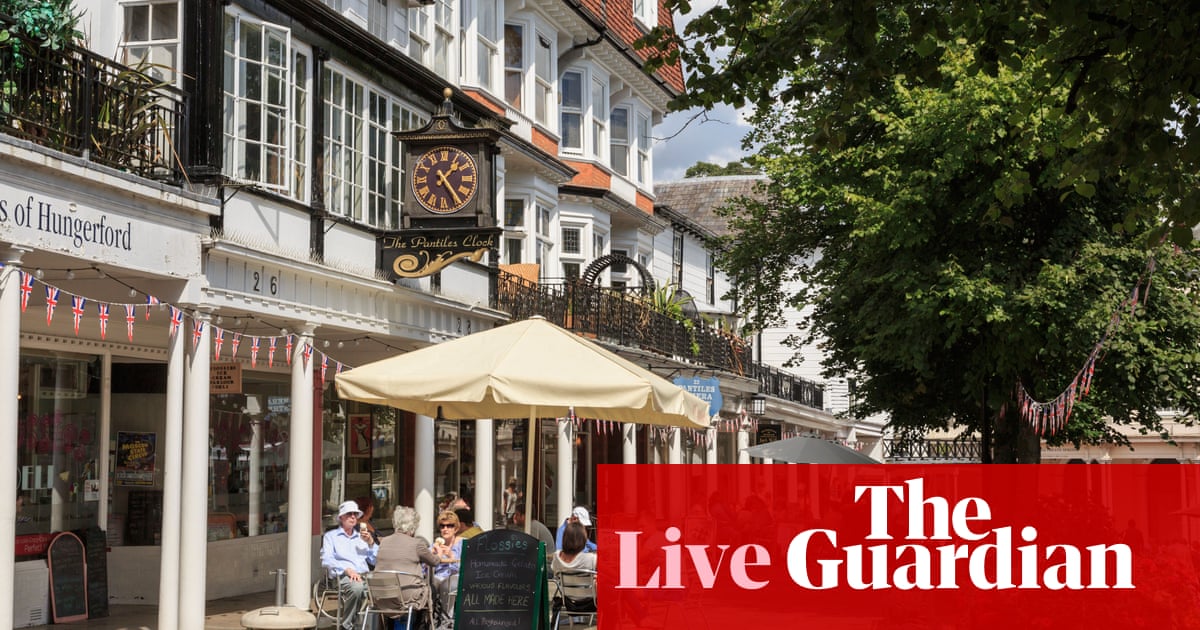
UK a ‘stagnation nation’ at real risk of a recession, says Resolution
The UK is a ‘stagnation nation’ at real risk of a recession, says the Resolution Foundation thinktank.
Following today’s GDP report, James Smith, Research Director at the Resolution Foundation, explains:
“The UK economy has stagnated again in recent months, driven in part by the rapid rise in interest rates since late 2021. There is a real risk that the UK could fall into recession for the fourth time in 15 years.
“Britain is a stagnation nation that has struggled to secure sustained economic growth since the financial crisis. Addressing this is the central task we face as a country, and must be at the heart of the Chancellor’s Autumn Statement in 10 days’ time.”
Afternoon summary
Time for a recap
The UK has been dubbed a ‘stagnation nation’ after failing to grow over the summer.
The economy was flat in the three months to September, the latest GDP data shows, with the dominant services sector contracting slightly.
Announcing the news, ONS director of economic statistics Darren Morgan said:
“The economy is estimated to have shown no growth in the third quarter.
“Services dropped a little with falls in health, management consultancy and commercial property rentals.
“These were partially offset by growth in engineering, car sales and machinery leasing.
“In the month of September the economy grew slightly, with increases in film production, health and education.
“This growth was partially offset by falls in retail and computer programming.”
The data was slightly better than expected, but highlights the damage that high interest rates are having on growth.
It means the UK fell behind the US and France, but did a little better than Germany and the wider eurozone.
Chancellor Jeremy Hunt said inflation was the main barrier to growth, while shadow chancellor Rachel Reeves warned that “growth is flatlining and Britain is worse off.”
European stock markets are in retreat today, on fears that US interest rates may not have peaked.
The Bank of England has asked more than 50 City institutions to model the impact of a sharp movement in bond prices caused by a severe geopolitical shock as part of its first financial system-wide stress test.
NatWest has scrapped almost £7.6m in potential payouts to Alison Rose, the banking group’s former chief executive, who was forced to resign over a scandal linked to the closure of Nigel Farage’s bank accounts.
The Guinness to Johnnie Walker drinks maker Diageo has issued a profit warning as a result of cash-strapped customers in Latin America and the Caribbean consuming less alcohol and seeking cheaper brands.
Vehicle breakdowns caused by Britain’s pothole-ridden roads reached record levels this year, according to the RAC.
The Industrial and Commercial Bank of China’s US arm was hit by a ransomware attack that disrupted trades in the US Treasury market on Thursday, the latest in a string of victims ransom-demanding hackers have claimed this year.
FTSE 100 on track for worst day since August
European stock markets have sunk deeper into the red, after Federal Reserve chair Jerome Powell hinted last night that US interest rates may not have peaked.
In London, the FTSE 100 index is now down just over one hundred points, or 1.35%, at 7354, on track for its biggest one-day loss since August.
David Morrison, senior market analyst at fintech and financial services provider Trade Nation, says:
Federal Reserve Chair Jerome Powell upset the apple cart during a speech yesterday evening.
He stated that the Fed wasn’t confident that it had done enough to tame inflation leaving the door open for further rate hikes. This wrongfooted traders who had convinced themselves that the US central bank was done hiking rates. It now looks as if that was wishful thinking.
Supermarket chain Booths, one of the (many) great things about the glorious north of England, is to axe almost all of the self-service tills in its stores, saying the decision was in response to feedback from customers.
Booths, an upmarket supermarket chain, said it believed staff serving customers delivered a better customer experience and had therefore taken the decision to remove self-checkouts from all but two of its 28 stores.
Nigel Murray, managing director of Booths, told BBC Radio Lancashire that customers had told the firm that its self-scan machines can be slow and were unreliable and impersonal.
Murray said:
“We like to talk to people and we’re really proud that we’re moving largely to a place where our customers are served by people, by human beings, so rather than artificial intelligence, we’re going for actual intelligence.”
The Bank of England has asked more than 50 City institutions to model the impact of a sharp movement in bond prices caused by a severe geopolitical shock as part of its first financial system-wide stress test.
The request comes after the September 2022 crisis in bond markets and sterling that followed Liz Truss’s mini-budget, when pension funds came under pressure and some were driven to near-collapse. A sharp shift in bond prices and the corresponding interest rates, or yields, laid bare major risks that certain kinds of liability-driven investing (LDI) posed to retirement savings.
Big banks, asset managers, hedge funds, pension funds and major insurers have now been asked to model how their operations might be affected by an unexpected swing in bond prices, sharing the results with the central bank by January.
Some long-term context on GDP:
Today’s GDP report provides “some comfort” as the UK heads into a winter in which worries about a Bank of England-led recession are likely to dominate headlines, says Holger Schmieding, chief economist at Berenberg:
As part of a broader European story, the UK economy has struggled to produce any real growth since early 2022 as two overlapping shocks intercepted a solid rebound from the pandemic-driven recession.
The first of the shocks, namely from surging gas prices in the wake of the Russian invasion of Ukraine in late-February last year, had mostly faded by summer 2023. But just as this shock started to ease, the cumulative impact of the Bank of England’s (BoE’s) aggressive monetary tightening to curb inflation began to weigh on demand.
But, Schmieding adds that K GDP has regularly beated consensus expectations over the last year, amounting to a cumulative 0.7 percentage points of upside surprises.
He argues there is a case for “modest” optimism over the outlook:
After a flat H2 2023, we expect a gradual pick-up of momentum through 2024 from a qoq rate of 0.2% in Q1 to a trend rate of c0.4% by Q4, with sustained gains at trend through 2025.
Our annual real GDP calls for 2023, 2024 and 2025 are 0.5%, 0.7% and 1.7% respectively
The head of the European Central Bank has indicated it isn’t in a rush to start cutting interest rates.
Speaking at the Financial Times Global Boardroom conference today, Christine Lagarde said eurozone inflation will fall to its 2% target if borrowing costs are kept at their current levels for “long enough”, adding:
“It is not something that [means] in the next couple of quarters we will be seeing a change. Long enough has to be long enough.”
Weapons maker BAE Systems is the top riser on the FTSE 100 so far today, up 1.8%.
They’ve gained almost 30% this year, as geopolitical risks have risen.
But the company’s factory in Rochester,Kent, has been blocked by a group of pro-Palestinian protesters this morning, urging Britain’s biggest military supplier to end arms sales to Israel.
Holding up a sign saying “Stop Arming Israel” and waving Palestinian flags, about 50 people stood in front of one entrance at the Rochester, Kent, site, where BAE tests and assembles electronic equipment used on military aircraft and in surveillance systems, Reuters reports.
Tens of protesters gathered at other entrances.
BAE said it does not directly export any equipment to Israel, but the group is a tier-one supplier on the United States-made F-35 fighter jets which are flown by Israel.
A BAE spokesperson said.
“We’re horrified by the situation in Israel and Gaza and the devastating impact it’s having on civilians in the region and we hope it can be resolved as soon as possible,”
“We respect everyone’s right to protest peacefully. We operate under the tightest regulation and comply fully with all applicable defence export controls, which are subject to ongoing assessment.”
Alison Rose has commented on NatWest’s announcement about her pay, saying:
“I am pleased that NatWest Group has confirmed that no findings of misconduct have been made against me.
I can also confirm acceptance of the terms of the settlement agreement, which is in line with NatWest Group’s remuneration policy, bringing the matter to a close.”
The news that the UK economy avoided shrinking in the last quarter could encourage the Bank of England to leave interest rates unchanged until well into 2024.
The financial markets currently predict rates will remain on hold at 5.25% until May or June next year.
Daniela Hathorn, senior market analyst at Capital.com, explains:
“The UK economy failed to grow in the third quarter but avoided falling into recession as markets were predicting. Q3 GDP released this morning came in at 0%. In the three months to June, the economy grew 0.2%. The data suggests that high borrowing costs are slowing economic activity while the cost-of-living crisis continues to weigh on household spending.
The reading was better than markets were anticipating, with a contraction (-0.1%) priced in for Q3. This allowed GBP [the pound] to halt some of the recent losses this morning, with GBP/USD finding some support along the descending trend line that was acting as prior resistance.
The data is likely to have eased fears that the Bank of England’s tightening has pushed the economy into recession which falls in line with expectations that rate cuts won’t be necessary until Q3 2024. That said, a stagnating economy is not a good sign when inflation remains above 6%. It also suggests that the economy is not weak enough to significantly slow down core inflation.”
Today’s GDP report shows that output in consumer-facing services is still 4.9% below its level in February 2020, just before the first Covid-19 lockdowns.
The rest of the services sector is 7.4% above its pre-pandemic levels, though.
The NIESR research institute has predicted the UK economy will grow by 0.1% in the current quarter.
They say:
We now forecast GDP to grow by 0.1 per cent in the fourth quarter of this year, entailing our central forecast does not expect a recession in 2023. These forecasts remain broadly consistent with the longer-term trend of low, but stable economic growth in the United Kingdom.
Major stock indexes in Britain and Italy provided by FTSE Russell suffered a brief outage this morning.
But they’ve now resumed operating properly, LSEG, the index provider’s parent says.
Three week ago, an incident also disupted trading in some stocks on the London Stock Exchange.
Why shrinking real money growth could mean a recession
Today’s bigger picture is that UK GDP growth has run out of steam, explains Professor Costas Milas, of the Management School at University of Liverpool.
He tells us:
The Bank of England’s policymakers will argue, and rightly so, that monetary tightening is working.
What is worrying, however, is that the UK economy is “flirting” with recession. To see this, just “follow the money” not only to see what is happening to UK inflation but also to growth.
The Chart below plots real Divisia M4 (q-on-q4) growth together with real GDP (q-on-q4) growth. Real money growth affects GDP developments with long and variable lags. In fact, real money growth turned negative in mid-2022. Since then, real money has shrunk fast.
This is very likely to push the UK into recession by early 2024 and, therefore, interest rate cuts might happen earlier than the BoE’s policymakers (seem to) think.
UK GDP: latest reaction
Lydia Prieg, Head of Economics at the New Economics Foundation, says the UK remains the ‘sick man of the rich world’, following today’s GDP report showing no growth in July-September.
Prieg explains:
“Today’s growth figures tell the same old story: the UK is the sick man of the rich world. We have one of the weakest post-pandemic recoveries in the G7. Why? Because a lack of investment over the past decade made us a poorer nation today.
“We have some of the highest energy bills in the world, which means less money for people to spend in the shops. Why? Because this government did not invest in insulation and renewables. Our workforce is shrinking because falling investment in our NHS meant people are too sick to work. A lack of public investment in green industries and infrastructure has led to lower wages at home.
We need to invest to make the British people more prosperous. Invest in renewables and home insulation to get energy bills down. Invest in the NHS and schools so that healthy, well-educated adults can actually go to work. And invest in green industry and infrastructure to get growth and wages rising again.”
Henry Cook, senior economist at Japaness bank MUFG, says the broader picture remains one of stagnation, adding:
A recession has so far been avoided but growth has been muted for six quarters now.
Our base case is that growth will continue to trundle along a flat or weakly positive trajectory into 2024, with a good chance of a contraction in at least one quarter. Overall, we expect the broader picture of stagnation will remain in place next year with 2024 annual growth around 0.5%.
The headline figure of 0% growth masks a “very weak picture”, explains Cathal Kennedy, senior UK economist at RBC Capital Markets.
The main positive contribution to third quarter GDP came from net exports (see Exhibit 1), exports rising 0.5% q/q due in the main to a rise in services exports. Imports (reflecting weaker domestic demand, see below) on the other hand fell 0.8% q/q. Inventories also rose.
Domestic activity was very weak, however. Household consumption fell by 0.4% q/q, investment (GFCF) fell 2.0% q/q, government consumption was down 0.5% q/q. In the case of the latter two that was a reaction to idiosyncratic factors; strikes in health and education suppressing government consumption, the end of the super-deduction allowance at the end of March which had seen business investment pulled forward into Q2.
Heads-up: Microsoft has warned that some users in the UK and German may not be able to access its Microsoft 365 suite of products.
That potentially includes online versions of Word, PowerPoint, Excel, and OneNote.
Full story: NatWest scraps more than £7.5m of Alison Rose’s payout after Farage scandal
Alison Rose will receive almost £1.75m from NatWest by next summer, 12 months after her resignation.
NatWest says:
The Board has confirmed that, in line with Ms Rose’s service agreement, payment of her fixed pay elements will be made for the remainder of her contractual notice period, which will end on 26 July 2024.
These contractual elements comprise salary, fixed share allowance and a pension allowance of 10% of salary and contractually agreed benefits in line with the terms of our approved Directors’ Remuneration Policy (DRP).
The total value over the remainder of the notice period is £1,748,142.




